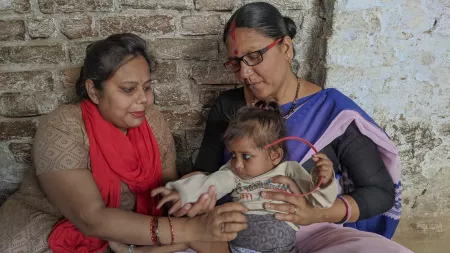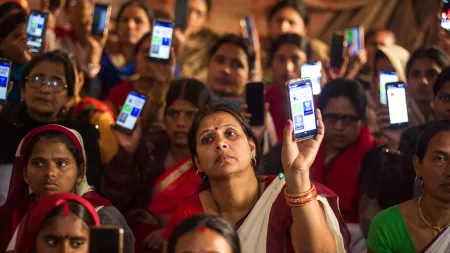Strengthening local health systems and community-based organizations
CARE International’s approach to strengthening health systems puts communities at the center. This ensures meaningful engagement and participation of women, youth, and other marginalized groups in planning, delivery, and monitoring of health services and resources.
To ensure equity, access, and quality of health services, we seek direction from our partners including community-based organizations, governments, and citizens.
We work with communities to:
-
Support and empower them to hold health providers and duty bearers to account by working together to identify barriers and solutions
-
Revitalize community health committees to oversee health resources
-
Accompany community-based groups led by women, girls and marginalized communities to advocate for their rights and needs
-
Shape the policies and programs that affect their lives and drive accountability
What is CARE International doing to strengthen health systems?
CARE International implements various approaches and interventions to strengthen health systems and increase health workforce effectiveness. Some of these approaches include:
-
Training: CARE International has applied clinical training in several countries, including among refugee populations and in active conflict zones, to ensure women, girls and their families receive high quality sexual and reproductive health services.
-
Regular, data driven supervision: Our programming is supported by a sound monitoring and data driven system. This allows us to provide ongoing support to health providers through regular coaching and by ensuring facilities provide quality services.
-
Interfacing with the community: CARE International has used the Social Analysis and Action and other approaches to facilitate dialogues with program participants where they can reflect on the social conditions that perpetuate their health challenges.
-
Mutual accountability: CARE International uses citizen-driven social accountability approaches (including the Community Score Card©) to increase the responsiveness and effectiveness of the health system and hold governments accountable for delivering on their commitments to quality service delivery.
CARE International’s Bihar health program in India has worked in support of the government health system to provide family planning, child health, nutrition, and maternal health services.
Bihar is one of India’s poorest states, with a population of more than 110 million and high rates of maternal, child, and newborn mortality. From 2010 until now, CARE International’s support contributed to the improvements in a range of health indicators, for example, maternal mortality (from 261 to 149 deaths/100,000 live births) and under-5 child mortality (64 deaths to 37 deaths/1,000 live births). Overall, the program has improved health services for more than 28 million women and children.


